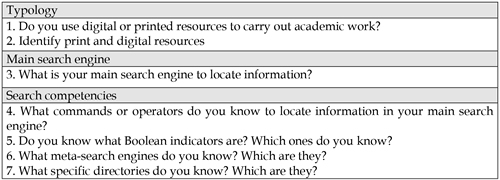
doi.org/10.15178/va.2022.155.e1375
RESEARCH
THE ANALYSIS OF THE INFORMATIONAL COMPETENCIES OF STUDENTS ENTERING UNIVERSITY: A CASE STUDY
ANÁLISIS DE LAS COMPETENCIAS MEDIÁTICAS DEL ALUMNADO QUE INGRESA EN LA UNIVERSIDAD: UN ESTUDIO DE CASO EN ESTUDIANTES DE COMUNICACIÓN
ANÁLISE DAS COMPETÊNCIAS DE MÍDIA DE ALUNOS QUE ENTRAM NA UNIVERSIDADE: UM ESTUDO DE CASO EM ESTUDANTES DE COMUNICAÇÃO
Aida María De Vicente Domínguez1
Mireya Rocio Carballeda Camacho1
Estefania Cestino González1
1University of Málaga. Spain
ABSTRACT
In the current era, it is necessary to train the new generations in competencies that allow them to be information literate. In this context, the general objective of the study is to analyze whether students entering university have information literacy skills in accessing information (Internet search strategies) to carry out their academic work. The objectives are: to identify the digital and printed resources they use to prepare academic assignments; to find out if they know meta-search engines and specialized search engines; to reveal which is their main search engine; and to investigate if they have the skills to access information through Boolean indicators, commands and operators. The methodology used is a questionnaire of open questions to students who have entered the degree of Advertising and Public Relations at the University of Malaga, in a compulsory subject.Malaga, in a compulsory subject. It is concluded that being digital natives does not imply having skills to locate reliable data in the huge amount of information located on the Internet as they present various dysfunctions such as lacking knowledge about theboolean indicators, commands and operators to search for information, and lack of knowledge of meta-search engines and specific directories. They also confuse browser with search engine and digital resources with tools, which makes it necessary to have formal training in specific subjects, courses or in a transversal way in different subjects. It is also recommended that each teacher provide students with useful digital resources to access reliable content of the subject taught, thus expanding their skills to access digital culture.
KEYWORDS: Communication, Information literacy, Search engines, Skills, Education, Internet
RESUMEN
En la era actual es necesario formar a las nuevas generaciones en competencias que les permitan tener una alfabetización informacional. En este contexto, el objetivo general del estudio es analizar si el alumnado que llega a la Universidad tiene competencias informacionales en el acceso de la información (estrategias de búsqueda en Internet) para realizar sus trabajos académicos. Los objetivos son: identificar los recursos digitales e impresos que usan para elaborar las tareas académicas; dar a conocer si conocen metabuscadores y buscadores especializados; detectar cuál es su principal motor de búsqueda; y valorar si tienen competencias para acceder a la información mediante los indicadores booleanos, comandos y operadores. La metodología usada es un cuestionario de preguntas abiertas al alumnado, que ha ingresado en el grado de Publicidad y Relaciones Públicas de la Universidad de Málaga, en una materia obligatoria. Se concluye que ser nativos digitales no implica tener habilidades para localizar datos fiables en la ingente cantidad de información ubicada en Internet pues presentan diversas disfunciones como carecer de un conocimiento sobre los indicadores booleanos, los comandos y operadores para buscar información, y desconocen los metabuscadores y los
directorios específicos. También confunden navegador con buscador y recursos digitales con instrumentos, lo que hace preciso formales en materias específicas, cursos o de forma transversal en diversas materias. Así como, se recomienda que cada docente aporte al alumnado recursos digitales de utilidad para acceder a contenidos fiables de la materia impartida ampliando así sus habilidades para acceder a la cultura digital.
PALABRAS CLAVE: Comunicación, Alfabetización informacional, Buscadores especializados de información, Competencias informacionales, Educación, Documentación en Internet
RESUMO
Na era atual, é necessário treinar as novas gerações em competências que lhes permitam ter alfabetização informacional. Nesse contexto, o objetivo geral do estudo é analisar se os alunos que chegam à Universidade possuem habilidades informacionais no acesso à informação (estratégias de busca na Internet) para a realização dos seus trabalhos acadêmicos. Os objetivos são: identificar os recursos digitais e impressos que utilizam para desenvolver trabalhos acadêmicos; mostrar se os alunos conhecem motores de meta-pesquisa e motores de pesquisa especializados; detectar qual é o seu mecanismo de pesquisa principal e avaliar se eles têm as habilidades para acessar informações por meio de indicadores, comandos e operadores booleanos. A metodologia utilizada é um questionário de perguntas abertas a alunos, que tenham ingressado no curso de Publicidade e Relações Públicas da Universidade de Málaga, em disciplina obrigatória. Conclui-se que ser nativos digitais não implica ter habilidades para localizar dados confiáveis na vasta quantidade de informações localizadas na Internet, uma vez que apresentam disfunções diversas, como falta de conhecimento de indicadores booleanos, comandos e operadores de busca de informações, e eles desconhecem os mecanismos de metabusca e diretórios específicos. Também confundem navegador com motor de busca e recursos digitais com instrumentos, o que torna necessária a formação de disciplinas específicas, cursos ou de forma transversal em várias disciplinas. Da mesma forma, recomenda-se que cada professor proporcione aos alunos recursos digitais úteis para o acesso a conteúdos confiáveis da matéria ministrada, ampliando assim suas habilidades de acesso à cultura digital.
PALAVRAS-CHAVE: Comunicação, Competência informacional, Buscadores de informação especializados, Competências informacionais, Educação, Documentação na Internet
Correspondence
Aida María De Vicente Domínguez. University of Málaga. Spain aidamaria@uma.es
Mireya Rocio Carballeda Camacho. University of Málaga. Spain mcarballeda@uma.es
Estefania Cestino González. University of Málaga. Spain ecestino@uma.es
Received: 15/04/2021
Accepted: 28/10/2021
Published: 03/01/2022
How to cite the article
De Vicente Domínguez, A. M., Carballeda Camacho, M. R., and Cestino González, E. (2022). The analysis of the informational competencies of students entering university: a case study.Vivat Academia. Revista de Comunicación, 155, 151-171. http://doi.org/10.15178/va.2022.155.e1375
1. INTRODUCTION
Technological evolution has modified the possibilities of access to information, generating a new information culture: digital. However, to access the data in the online format it is necessary to have the skills to correctly locate the information sought among the vast amount of content hosted on the Internet. And it is that, if to access literate (printed) culture it is necessary to know how to read and write, as well as to know where to locate printed resources, now it is necessary to train students to search for digital content (Coll, 2005).
A competence that is part of information literacy, understood as, from the point of view of educational and documentary institutions, "the service and activities to achieve the teaching-learning of the concepts, procedures, and attitudes related to access and use of information” (Gómez Hernández, 2002, p. 5). A training that, in the current era, is considered "a pillar in educational institutions (...) to ensure that people prepare and develop information skills to meet their work and educational goals" (Toledo and Maldonado-Radillo, 2015, p. 60).
Specifically, this research focuses on analyzing this competence in students entering university. And it is that, since the implementation of the Internet as a method of access to information, the urgent need to train the new generations in these skills began to be indicated. More than a decade ago, Tejedor (2008) warned that people who did not acquire digital skills, in a few years would be considered illiterate and would have a disadvantaged position in society (cited in Gutiérrez and Serrano, 2018, p. 78). That is why it is intended to know if new university students have acquired this competence in the education cycles before university.
National and international studies are addressing "how technology should be included as a fundamental nucleus of study at primary and secondary levels" (Cabero, 2006, p.159). And the high number of research works focused on detecting the abilities that students have in higher education institutions to access and locate information on the Internet, indicate the importance given to it worldwide. Take as a reference those carried out at the Universidad Estatal de Lima Metropolitana (Sausuure and Portilla, 2017); the Universidad Católica de Santo Toribio de Mogrovejo in Chiclayo of Peru (Rumiche and Chunga, 2019), or the Institute of Human and Information Sciences of the Universidad Federal de Rio Grande (Bermúdez, Braz, and Serrano, 2015).
At the European level, notable are the research works carried out on German psychology students (Leichner, Peter, Mayer, and Krampen, 2013); doctoral students from the University of Warsaw in Poland and the University of Lille in France (Wiorogórska, 2014); the student body at the University of Parma (Vezzosi, 2009); or the Institute of Technology of the University of Descartes in Paris (Boustany, 2013). However, other significant approaches are made up of research works that analyze the presence of this competence in the study plans, such as the one approached at the University of Zadar (Rubinic, Stri?evi?, and Juric, 2013); or those that expose the results obtained from the courses given on information literacy (Špiranec and Pejova, 2010) and the methods used to impart these competencies (Spivakovska, Osipova, Vinnik, and Tarasich, 2014); together with those that report on projects created by the European Union, such as the one promoted within the Erasmus+ programmatic sector in the form of the Massive Open Online Course (MOOC) coordinated by the University of Graz called "Information Literacy Online" (Dreisiebner and Mandl, 2017).
In Spanish universities, which is where this research is framed, the studies have been carried out mainly in the Faculties of Education, that is, they have focused on
the capacities and abilities of future teachers. The level of knowledge, use, and attitudes towards ICTs by teaching students from Albacete (specialized in early childhood and primary education belonging to the second year) at the Universidad de Castilla la Mancha has been analyzed (del Valle, Hernández Bravo; Hernández Bravo and Cózar, 2011); researched, together with other variables, the browsing, searching, and information filtering competencies in the students of the degree of infant and primary education of the Universidad Internacional de Valencia (Moreno, Garbada, & Rodríguez, 2018); as well as, researched in the predispositions and informative behaviors of university students regarding the Internet search activity of the Faculty of Education of the Universidad de Salamanca (Hernández and González, 2010); or in the processes of search, access, and selection of digital information of the university teachers of infant and primary education of the ISEN Cartagena, a center attached to the Universidad de Murcia, (Gutiérrez and Serrano, 2018); or in the teaching students of the Universidad de Jaén (Molero, 2005).
Competencies that have also been researched in university students studying translation and interpretation at the Universitat Autónoma de Barcelona to know their consultation habits and academic purposes (Cid and Perpinyá, 2015); or in the final year students of Alicante (Laguna, 2013) to show how they document themselves to carry out academic tasks; as well as, in the nursing students of the Terres de L´Ebre campus at the Rovira i Virgili University to search and select academic information on the Internet (Camacho, 2011); or, of the student body of the Universidad de las Islas Baleares (Comas, Pastor, and Morey, 2011); and carried out diagnoses on the informational competencies based on the perception by the students of the Universidad de Granada of the branches of knowledge in Arts and Humanities, Sciences, Health Sciences, Social and Legal Sciences, and Engineering and Architecture (Pinto and Guerrero, 2011).
Other studies have focused on analyzing these competencies in university students enrolled in the Faculty of Audiovisual Communication of the Universidad de Mondragon Unibertsitatea (Egaña, Bidegain, and Zuberogoitia, 2013), and finding out the opinion of the students of the Audiovisual Communication degree of the Universidad de Granada on their own competencies and abilities in the management and use of information (Puertas and Pinto, 2010).
Now we expand this line of research by analyzing the competencies in information search on the Internet that the students who enter the degree in Advertising and Public Relations at the Universidad de Málaga have. The type of resources (printed or digital) that students use for their academic work is analyzed, which are the main search engines they use, and the knowledge they have about their tools and services. And it is that Royal Decree 1631/20064, of December 29th, established that one of the minimum teachings corresponding to Secondary Education would be to acquire skills to access information, including information technologies as an essential element to be informed, learn, and communicate. This is why it is intended to know if these new generations have these acquired skills. A study that focuses on search engines since, as Nachmias and Gilad (2002) already warned, several researchers recommend more studies on the behavior of users towards search engines. Some data on their acquisition are "a reflection of the extent to which educational systems are or are not at the level of the new information societies" (Waheed, 2009, p, 6).
2. OBJECTIVES AND METHODOLOGY
The objectives set out in the study are: to research whether students use digital or printed resources to prepare their academic work; identify the print and digital resources they use to document themselves; detect which is their main search engine to locate information; identify if they know the commands or operators and Boolean indicators as search strategies; assess whether they know what meta-search engines and specialized search engines are, and indicate which are the main meta-search engines and specialized search engines that they know.
And for the methodology, it has been based on the following phases:
A questionnaire made up of seven items grouped into three variable variables: typology (items 1 and 2); main search engine (items 3); search competencies (items 4, 5, 6, and 7). Codes that are based on a similar design from previous studies.
Table 1. Questionnaire items

Source: self-made
The questions are open to prevent the students from choosing between a finite set of alternatives, making use of one of the advantages of this modality indicated by Pope (2012), which is the “collection of spontaneous information” (cited in Rincón, 2014, p. 141) and also because they are the ones used when it comes to exploring and deepening a topic.
The questionnaire was uploaded to the virtual campus of the subject and the students proceeded to fill it in during class hours with an estimated response time of 10 minutes without any incident occurring. The data is not available on the Internet and is confidential. Of the 130 students that make up the total population of the sample, 108 students responded to the questionnaire, which implies a confidence level of 95% and a margin of error of 4%. Data collection was carried out on April 9th, 2021.
Data collection technique: the analysis technique to analyze the data is performed by grouping the responses into categories, giving them a code with their corresponding numerical assignment to be tabulated and coded.
3. RESULTS AND DISCUSSION
The results indicate high use of the Internet to carry out academic tasks, as 48% use exclusively online material and 49% combine it with printed material, never choosing to only use printed material. These data imply that the Internet is their main documentary resource. A trend that has already been implemented for decades. Egaña, Bidegain, and Zuberogoitia (2013) indicated: “The Internet has been the main source of information for university students for some years now (British Library; JICS, 2008; Fuentes Agustí; Monereo, 2008; Benítez de Vendrell, 2007; Sureda; Comas, 2006; Nazim; Saraf, 2006; OCLC, 2005)” (p.2). Results that also corroborate those provided by Comas, Sureda, Pastor, and Morey (2011).
This high use is considered because digital natives "handle technologies in a normalized way in almost all aspects of their lives" (Larrañaga and Cubero, 2019, p.
52) and, therefore, they also apply them for their academic tasks. Although, other theories indicate that it is because students are “aware that on the web they will find everything they need to carry out their tasks” (Balaguera and Villegas, 2012, p. 161).
However, it stands out that although the search for information for academic tasks is mainly through digital resources, access to print culture continues to be part of the search process in one of every two university students since 49% of the analyzed sample combines digital resources with printed ones. Gutiérrez-Porlán, Román- García, and Sánchez-Vera (2018) consider that when “the tasks become more complex and require greater involvement, the use of the Internet is lower (cited in Elche and Yubero, 2020, p. 53). A combination that other researchers state occurs because young university students have access to different digital information media and technological supports for reading that are complemented by reading traditional printed sources (Chávez, Flores, Ordoñez, and Sánchez, 2020). Although, this combination of formats is generated, according to Kitamura (2013), depending on the device of use, since it reveals that the Internet use through mobile phones has complementary effects on the acquisition of information from traditional media, while the Internet use through personal computers does not have them.
Source: self-made
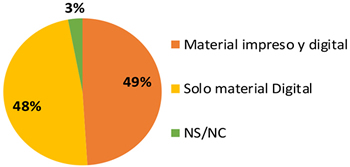
Figure 1. Type of resources used for academic tasks
When they resort to printed documentation, the results show that they mainly consult, in descending order: books (37%), notes (15%), newspapers (12%), journals (11%), encyclopedias (10%), and dictionaries ( 8%). While the main digital resources they use are, in descending order: web pages (20%), social networks (12%), newspapers (10%), blog (9%), videos (8%), digital journals (6%), articles (5%),
presentations (5%), Wikipedia (4%), books (3%), podcast (2%), academic papers (2%),
notes (1%), thesis (1%), and FDP (1%).
Medina (2020) considers that “Internet and web sources seem to have relegated books, whether printed or electronic (…) to a more than secondary role” (p. 88). And these data reveal how books are still the main resource when they access the printed
format to document themselves, but that when they resort to the digital environment, they have a preference for web pages and social networks. Bonilla, Diego, and Lena (2018) also obtain in a study carried out on more than 200 Spanish university students that they use social networks “often to work collaboratively and help each other with academic tasks” (p. 324), standing out that students are not content producers, but are media consumers.
Significantly, 3% of the answers have been wrong because the students have indicated as a digital resource to locate information the mobile phone, television, computer or laptop, and the tablet when they are the instruments to access the Internet.
Source: self-made
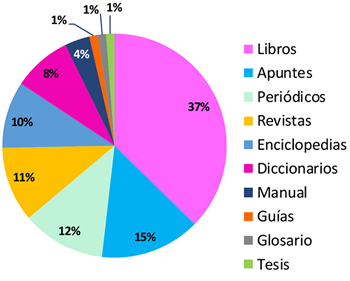
Figure 2. Printed resources used for academic papers
Source: self-made
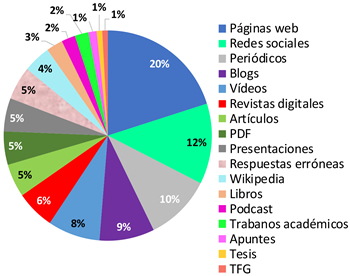
Figure 3. Digital resources used for academic assignments
The data obtained on search engines reveals that 84% of the sample uses Google as the main search engine. Although, 9% of the sample under study have a preference for other search engines, which in descending order are: Google Scholar (5%), Bing (2%), and Ecosia (2%). The remaining 7% indicate they do not know what their main search engine is or they do not answer. Data that indicates a high preference for Google and that coincides with those obtained in previous studies (Sureda, Comas, and Urbina, 2006; Hernández and González, 2011; Comas, Pastor, and Morey 2011; Egaña, Bidegain, and Zuberohoitia, 2013; Cid and Perpinyá, 2015). In fact, as Santovenía, Andalia, Ochandarena, and Brito (2007) indicate “the entry of google in various dictionaries reflects the popularity of the search engine to the point that the term googling became for millions of Internet users a synonym for searching for information” (p. 3).
It stands out that 6% of students present deficiencies in conceptualization because when asked, some confuse browsers with search engines: they state that their main search engine is Safari, Firefox, Opera, Chrome, or Edge, when these are browsers.
2% 2%
Source: self-made
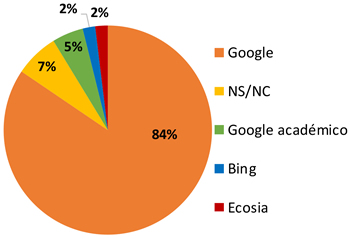
Figure 4. Main search engine
In this context, González Rivera and Santana (2008) warn that it is increasingly alarming “the preference reached by the Google search engine, an engine that, even when it has enormous potential, must be exploited with great care, especially by` inexperienced hands´, taking into account the ostensible quality differences presented by the resources recovered through the search in this engine” (p. 3). And, as the results reveal, the students object of the sample use this search engine, but they do not have the skills to correctly locate the information.
The results indicate that 89% do not know the Boolean indicators compared to 11% who indicate they do. Although, of the 11% who know what they are for, only 36% use them compared to 55% who never insert them in their search processes and
6% who indicate they use them sometimes. Thus, the students do not know how to establish the logical relationships between the search terms, mainly because they do not know the existence of the Boolean operators: OR, AND, and NOT. This rejection and ignorance of the use of Boolean indicators in university students coincide with the research of Gutiérrez and Serrano (2018).
Source: self-made
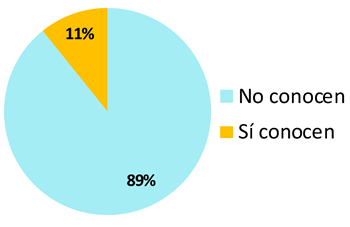
Figure 5. Knowledge of Boolean operators
The data also reveals that they do not have informational training in the use of Google commands and operators to locate content in the vast amount of data on the Internet. Although 51% indicate that they know them compared to 49% who do not know their existence, their knowledge is scarce among those who identify them because, in descending order: 52% only specify one, 20% three, 17% two, 5% four commands, 3% six, and another 3% know seven commands.
A conceptualization dysfunction also stands out when asked about the commands because some respond that they are the use of keywords, cookies, or Chrome, along with others.
And taking into account other search competencies, the data indicates that 78% do not know that there are specialized search engines compared to 22% who do indicate they know them, although as has happened with Google commands or operators, few are identified because of the 22% who indicate they know them: 74% only expose one, 14% two, 6% three specialized search engines, 5% four, and 1% five. Specifically, the most represented with 71% is Google Scholar. And with a very low representation they exhibit: Chemedia (6%); Dialnet (4%); Educaweb (4%), Science Research (2%), or Scielo (2%). Thus, as Cid and Perpiñan (2015) already revealed, among the unknown resources by young university students, specialized search engines, directories, and specialized bibliographic databases would be included.
Source: self-made
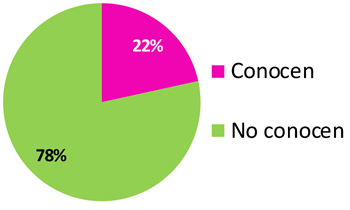
Figure 6. Knowledge of specialized search engines
Source: self-made
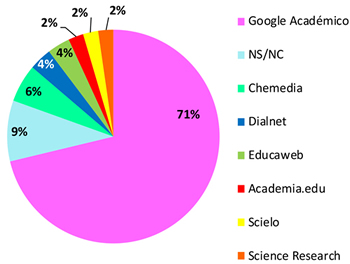
Figure 7. Identification of specialized search engines
Regarding meta-search engines, the data reveal that 63% do not know any, compared to 37% who do indicate they know them, these being, in descending order: Dogpile (26%); Onessek (13%); Metacrawer (5%); Duckdukgo (2%), and Looksmart (2%). Although, it stands out that 52% of the answers about known meta-search engines are wrong: thus, for example, 24% consider that Yahoo! is a meta-search engine, when it is a search engine. Or 2% believe that Gmail is a meta-search engine. An ignorance that Hernández and Fuentes also reveal, 2011.
Source: self-made
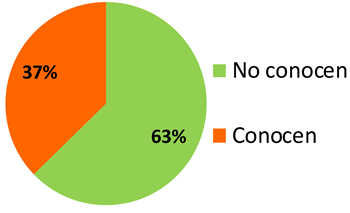
Figure 8. Knowledge of Meta-search engines
Source: self-made
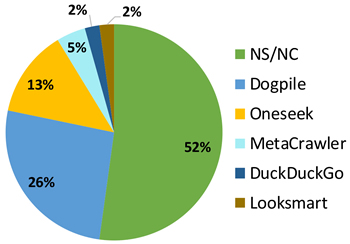
Figure 9. Identification of meta-search engines
Cabra Torres and Marciales-Vivas (2009) revealed the existence of “insufficient empirical evidence to characterize digital natives as skilled users in the use of various technologies” (p. 330). And this study confirms that they have an instrumental mastery of the devices but that, indeed, this does not imply mastering the skills and competencies to manage access to information on the Internet for academic work. Nor does being born in a technological environment imply mastering technologies. Data that coincides with the study by Castellano, Sánchez, and Calderero (2017): the studied university students do not share the traits expected of a digital native, especially regarding consuming culture through the Internet (cited in Henríquez, Andrade, and Moreno, 2018, p. 61)
Gutierrez and Serrano (2018) also corroborate this and highlight that other research works (Egaña, Bidegain, and Zuberogoitia, 2013; Egaña, Zuberogoitia, Pavón, and Brazo, 2012; Fuentes and Monereo, 2008; Gutiérrez and Serrano, 2016; Hernández Serrano, 2009; Hernández and Fuentes, 2011; Laguna, 2013, and Valadez,
Páez, and Zapata, 2005) (p. 86) also indicate that there seems to be evidence that university students are not always as desirably competent in searching and accessing digital information.
CONCLUSIONS
The contribution of this study to the theoretical implications provided on the degree of ability of digital native generations to search for information on the Internet is to strengthen the position that digital natives who are pursuing university studies do not have the skills to search for information on the Internet. They do not have these competencies acquired from previous education cycles, or at least, those of the analyzed sample have not acquired them. Thus, we conclude with the urgent need, already warned for decades, to promote educational strategies that allow the management of these skills and attitudes because the students present an instrumental but not informational literacy.
The current state of the search processes of the analyzed students tips the balance towards theories that affirm that a new information culture is being generated to access the documentation with which to carry out academic works. Although this culture is based on the high use of the internet to carry out searches, it is concluded that print culture continues to be a resource that is also used, although always combined with digital resources. Thus, in the management of knowledge of digital culture, the continuous training of the literate or printed culture should not be ignored, to continue complementing the traditional with technological advances.
This work contributes to the existing literature an X-ray of the presented dysfunctions, the identification of which is considered suitable for the development of education programs to alleviate them. Specifically, it is necessary to train them in Boolean indicators, meta-search engines, specialized search engines, Google commands or operators. Therefore, these deficiencies must also be solved through specific courses, or crosswise in each of the teaching subjects.
It is concluded that they also present other deficiencies such as confusing digital resources with the instruments that allow access to the Internet (computer, television, or mobile phone), not differentiating between browsers or search engines, or believing that the commands are cookies. Which makes it essential to also train students in these conceptualizations.
Likewise, given that they tend to use the Internet to carry out documentary searches, it is recommended that teachers, in each of their specialties or subjects they teach, provide students with web pages of interest for consultation, as well as social profiles that they consider useful because they tend to turn to these sources mainly to locate content. As well as all those digital resources that teachers consider of interest to improve these skills. Thus, education must adapt to new trends, without neglecting print culture.
Future studies will analyze these competencies in larger samples that allow obtaining general results from the total Spanish university population entering the university. Although one of the delimitations of this study is that it is a specific group, indicative data is provided to gauge whether informational competencies are being implemented in these generations to access specialized information and develop significant documentation.
REFERENCES
AUTHOR/S
Aida María De Vicente Domínguez
Ph.D. in Communication from the Universidad de Granada. She specialized in Digital Communication. She is a professor of the degrees of Journalism, Audiovisual Communication, and Advertising at the Universidad de Málaga. She is part of the team of the Comunicar Group of Málaga (Andalusian Collective of Communication and Education) and the scientific committee of the collection of educational innovation. Via Docendi at the Universidad de las Palmas de Gran Canarias. She currently coordinates the monographic “Transformation and educational innovation during the COVID-19 crisis. Styles and models of teaching and learning” in the journal Estilos de Aprendizaje.
Orcid ID: https://orcid.org/0000-0002-8085-5097
Mireya Rocio Carballeda Camacho
Degree in Audiovisual Communication from the Universidad de Malaga. She is a doctoral student in the Interuniversity Doctorate in Communication program. She is a professor of the degrees of Journalism and Audiovisual Communication of the Faculty of Communication Sciences of the Universidad de Malaga. Member of the research group sej435: advanced audiovisual content (communication).
Orcid ID: https://orcid.org/0000-0002-0754-898X
Estefania Cestino González
Professor of the Department of Audiovisual Communication and Advertising at the Universidad de Malaga. She has a degree in Audiovisual Communication. She graduated in Speech Therapy. Hearing and Language Teacher.
Orcid ID: https://orcid.org/0000-0002-2436-8665